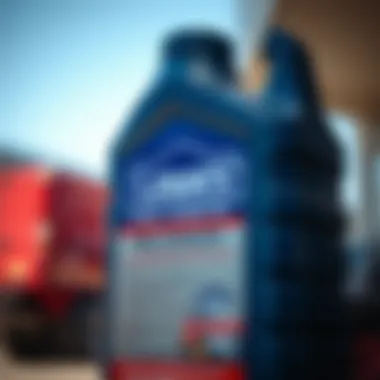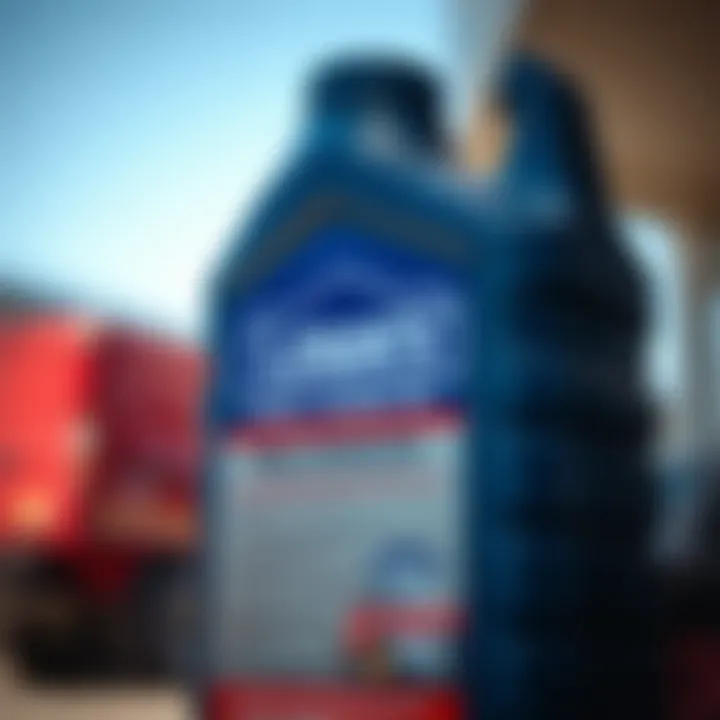Essential Insights on Lowes Small Engine Oil


Intro
In today's fast-paced world, small engines play a vital role, especially for those invested in agriculture and horticulture. Lowes small engine oil emerges as an essential component in keeping these machines operational at their best. This article aims to break down the crucial aspects associated with Lowes small engine oil, providing vital insights into why it matters.
Lowes small engine oil's formulation is not merely a technical detail; it directly influences the engine's performance, longevity, and efficiency. Understanding this product involves looking at its specifications, applications, and the best practices for usage. Moreover, knowing how it interacts with various engines can save time and costs while ensuring that machinery hums along nicely in the fields or gardens.
Additionally, eco-friendliness is a significant concern for many modern farmers and gardening enthusiasts. This article will touch on environmentally safe alternatives, leading us towards a greener approach to machine maintenance. By the end of this exploration, readers will be equipped with the knowledge needed for informed decisions, allowing a smoother operational flow in their agricultural pursuits.
Key Concepts and Terminology
Definition of Terms
Before diving deep into the specifics of Lowes small engine oil, it's important to clarify some key terms:
- Viscosity: Refers to the thickness of the oil, affecting how well it flows through engine components. Higher viscosity oils are thicker and suitable for warmer conditions.
- Additives: These are chemicals added to engine oil to enhance its properties. They can include detergents to keep engines clean and antioxidants to prolong the oil’s life.
- API Rating: The American Petroleum Institute (API) rating indicates the quality and performance level of motor oils. Lowes small engine oil adheres to specific API standards, ensuring reliable performance under varying conditions.
Overview of Relevant Practices
Using Lowes small engine oil effectively requires knowledge of proper practices:
- Selecting the Right Oil: Pay attention to your engine's requirements, including the recommended viscosity and specifications. Always check the user manual before making a purchase.
- Regular Changes: Just like humans need regular check-ups, small engines require oil changes to remain healthy. It's advisable to follow the guidelines on the oil container or the user manual regarding change intervals.
- Storage Conditions: Proper storage of oil is crucial. Keeping it in a cool, dry place protects it from degradation and ensures its effectiveness when used.
Current Trends and Innovations
Latest Research and Developments
The landscape of small engine oil is continuously evolving with ongoing research focused on improving formulations. Recent studies show that synthetic blends could offer better engine protection and improved fuel efficiency compared to traditional mineral oils.
Emerging Technologies and Tools
New tools in the market enable users to monitor oil quality more conveniently. Devices providing real-time data help ensure that machinery runs smoothly without unexpected breakdowns. Innovations like these are changing how we maintain small engines, making it essential to stay informed.
Practical Applications
Step-by-Step Guides
- Choosing the Right Lowes Small Engine Oil: Start by reading the engine's manual. Look for viscosity recommendations and any specific certifications.
- Changing the Oil:
- Disposing of the Old Oil: Never pour used oil down drains or into the ground. Contact local disposal facilities or recycling centers for proper disposal methods.
- Gather the necessary tools, including a wrench, oil pan, and the new oil.
- Warm up the engine slightly to thin the oil, making it easier to drain.
- Remove the oil drain plug and let the old oil flow into the pan. Once drained, replace the plug.
- Fill in the new oil as per the guidelines, ensuring not to overfill.
Troubleshooting Common Issues
If your engine is not running smoothly:
- Check if the oil level is adequate and whether it needs a change or top-up.
- Look for oil leaks around seals and fittings.
- If issues persist, consulting a mechanic may be necessary.
"Regular maintenance using quality oils like Lowes small engine oil is not just good practice; it's an investment in the lifespan of your equipment."
Being informed about these main aspects provides a sturdy foundation for using Lowes small engine oil effectively, ensuring better performance and longevity of your small machinery.
For more detailed information and guidelines, visit reliable sources such as Wikipedia and Britannica.
By gaining insights into these topics, you will not only maintain your equipment more effectively but also contribute towards a sustainable future in agriculture.
Preface to Lowes Small Engine Oil
When it comes to keeping machinery in tip-top shape, Lowes Small Engine Oil plays a pivotal role. This specific oil is engineered to cater to the unique needs of small engines, which power everything from lawn mowers to garden tillers. Not only does it lubricate, but it also aids in cooling these engines, thus ensuring optimal performance and longevity.
With small engines being the workhorses of many agricultural and horticultural tasks, the importance of selecting the right oil cannot be overstated. In this section, we will delve into the various aspects that define Lowes Small Engine Oil and why it's essential for machinery's reliability and efficiency. Clearly, not all oils are created equal, and understanding this distinction can significantly impact the lifespan of your equipment.
Defining Small Engine Oil
Small engine oil is specifically formulated to meet the demands of engines found in equipment like push lawn mowers, snow blowers, and leaf blowers. Characteristically, these engines operate at higher speeds and temperatures than standard engines, necessitating an oil that can withstand such conditions. Lowes Small Engine Oil is designed to provide the right balance of viscosity and performance-enhancing properties.
The base oils used in this formulation often include a blend of mineral and synthetic oils. Such a blend ensures that the oil remains stable under the extreme conditions typical for small engines—a common scenario where the efficiency of the oil becomes crucial.


Importance for Small Engines
Using the right small engine oil, such as Lowes offering, can yield substantial benefits for your equipment. Small engines often struggle with dirt buildup and wear, which can reduce efficiency. Regular use of a quality oil can minimize friction and wear, extending the life of the engine.
"The right small engine oil can be the difference between smooth operation and catastrophic failure."
Moreover, this product not only ensures engine health but also contributes to fuel efficiency. When engines are lubricated appropriately, they consume fuel more effectively, which can translate to significant savings over time—especially for farmers and gardening enthusiasts who rely on these machines for daily tasks.
In summary, understanding the essential role of Lowes Small Engine Oil is critical for optimizing the performance of small engines. As we proceed, we will further explore the formulation of this oil, its specific applications, and the benefits it brings to the table.
Composition of Lowes Small Engine Oil
The composition of Lowes small engine oil is a fundamental topic, influencing performance, longevity, and efficiency of small engines. Knowing what goes into this oil can help users make informed choices and foster better care of their machinery. Let's dissect the components that make up this essential fluid, focusing on the types of base oils used and the various additives that enhance the oil's efficacy.
Base Oils Used
The base oil in any lubricant is the main ingredient, forming the bulk of the composition. In Lowes small engine oil, you'll typically find a mix of mineral and synthetic oils.
- Mineral Oils: Extracted from crude oil, these oils are often praised for their ability to provide basic lubrication and are generally more affordable. However, they can break down more quickly under high temperatures compared to synthetics.
- Synthetic Oils: On the other hand, synthetic oils are crafted through chemical processes, offering superior performance in extreme conditions. These oils resist oxidation and thermal breakdown, making them ideal for both demanding environments and prolonged engine use. When Lowes offers a blend of these oils, it aims to strike a balance between cost and performance.
One such blend might look something like this: a formulation rich in synthetic components that still includes some mineral oil for cost considerations. This balance often results in a product that not only protects but also performs optimally under various conditions, proving advantageous for farmers who depend on their equipment daily.
Additives and Their Roles
Additives often get overlooked, but they serve critical roles in ensuring that the oil functions well. The additive packages included in Lowes small engine oil feature a range of compounds, each designed to address specific challenges faced by small engines. Some of the notable additives include:
- Detergents: These keep the engine clean by preventing sludge and deposit buildup, promoting a longer engine life.
- Dispersants: Similar to detergents, these help in keeping particles suspended in oil, preventing them from settling and causing problems in small parts of the engine.
- Anti-wear Additives: These additives create a protective film on engine components, reducing friction, and wear, particularly during high-stress operations.
- Viscosity Index Improvers: These assist in maintaining oil viscosity across various temperature levels. This is significant for small engines that often operate in fluctuating environments, especially in agriculture where conditions can change rapidly.
- Corrosion Inhibitors: They offer protection against rust and corrosion, which is essential for machinery exposed to the elements.
Understanding these components within Lowes small engine oil not only guides you in selecting the right product but also helps you appreciate the intricacies that go into ensuring your equipment’s reliable performance. After all, a well-maintained engine is the heart of effective operation in agricultural settings and beyond.
“The right oil can mean the difference between a smoothly running engine and headaches down the line.”
With these elements working together, Lowes small engine oil provides a robust solution for small-engine maintenance, ensuring that engines not only run but thrive.
For more information on base oils and additives, you might find these resources useful:
Specifications and Standards
Understanding the specifications and standards is vital when it comes to using Lowes small engine oil. These guidelines ensure the oil performs efficiently and meets the specific needs of various small engines. By adhering to these standards, users can better understand the product they are using, improve engine lifespan, and optimize overall performance. When you know what to look for in oil specifications and ratings, selecting the right oil becomes much less of a guessing game.
API and SAE Ratings
The American Petroleum Institute (API) and the Society of Automotive Engineers (SAE) provide crucial ratings for engine oils. These ratings serve as a benchmark for quality, ensuring that the oil contains the right components to protect and enhance engine performance.
- API Ratings: API ratings on oil containers indicate that the oil meets industry standards. A higher rating signifies better protection and performance. For instance, an oil rated as "SN" or "SP" is suitable for modern engines, ensuring they are well-lubricated and efficient.
- SAE Ratings: SAE ratings pertain to the viscosity of the oil, indicating how thick or thin the oil is at different temperatures. For example, a 10W-30 oil has a viscosity of 10 in cold temperatures and 30 when hot. This versatility allows the oil to function optimally under varying operating conditions, making it suitable for diverse applications.
Understanding these ratings can not only prolong the life of small engines but can also enhance their efficiency. Choosing oil with the right API and SAE ratings can be the difference between a smoothly running engine and one that struggles under the strain of improper lubrication.
Viscosity Grades
Viscosity grades are another area where many users can feel overwhelmed. However, grasping this aspect is essential for maintaining the health of small engines. The viscosity grade affects how the oil flows and its ability to maintain a protective film over engine parts during both cold starts and peak operating temperatures.
- Cold Start Performance: The lower the first number in an oil grade (like the "10" in 10W-30), the better it performs in cold weather. This is crucial for engines that start in low temperatures, as low-viscosity oil flows more easily.
- Hot Weather Performance: The second number indicates the oil's performance when the engine reaches operating temperature. Oils with higher numbers provide better protection against the wear that occurs when engines are hot. For example, a 30-weight oil will maintain a thicker protective layer compared to a 20-weight oil in high-temperature scenarios.
When choosing the right viscosity grade, consider the climate you operate in and the specific engine requirements.
"Understanding API and SAE ratings, along with viscosity grades, can be a game changer for anyone serious about engine care. Missing these key details can lead to poor performance and costly repairs."
Applications of Lowes Small Engine Oil
When it comes to maintaining small engines, Lowes Small Engine Oil plays a pivotal role. It's not just about keeping the engine running; it’s about ensuring it runs efficiently, with longevity and resilience in various conditions. This section explores how this oil can be applied, dissecting its specific applications and benefits, ultimately aiding users in making informed decisions.
Ideal Engines for Use


Lowes Small Engine Oil is formulated with versatility in mind, making it suitable for a range of small engines. These typically include:
- Lawn Mowers: Many gardeners rely on their mowers for maintaining lush lawns during the growing season. Lowes oil helps ensure these engines operate smoothly and effectively.
- Chainsaws: Whether you’re pruning an overgrown tree or cutting firewood, a chainsaw needs the right oil to function properly, and Lowes meets that need with its specific formulation.
- Trimmers and Blowers: Keeping your garden neat and tidy involves recognizing the right small engine run-time. With Lowes oil, you can trust that your trimmers and blowers get the care they need.
The oil caters to two-stroke and four-stroke engine applications, providing a solution for various power equipment. In essence, if you're running a small engine, this oil is a smart pick to prevent wear and tear, ensuring that your tools stay in prime condition.
Suitability for Agricultural Machinery
In the realm of agriculture, machinery often takes a beating. Small engines have a role far beyond basic landscaping; they’re essential in tasks like:
- Tilling Soil: Many farmers utilize small engines in equipment meant for breaking ground and prepping soil for planting. Lowes oil can handle the rigors of tilling, ensuring that these machines run smoothly.
- Pumping Water: In irrigating fields, pumps with small engines are common. Lowes Small Engine Oil provides lubrication that helps these pumps operate reliably, especially in extreme weather.
- General Maintenance Tasks: Farmers often find themselves needing versatile machinery for diverse tasks. With Lowes oil, these small engines are safeguarded against overheating and damage, providing essential reliability.
With agricultural settings demanding horsepower and endurance, proper lubrication becomes paramount. Lowes Small Engine Oil supports this need by delivering the performance expected from high-quality engine care.
"Using the right engine oil is not just a matter of choice; it’s a matter of endurance and reliability, especially for those who count on their equipment daily."
Adopting Lowes Small Engine Oil signifies a commitment to maintaining equipment health and reliability. It’s paramount for those in the agricultural sector to understand what products can offer a tangible edge in performance, and Lowes fulfills that requirement through its varied applications.
Benefits of Using Lowes Small Engine Oil
Lowes small engine oil is not just another additive; it serves as a lifeline for machinery that farmers and gardeners rely on daily. Utilizing this specific oil can lead to a remarkable enhancement in performance and longevity of small engines, which is critical for those using them in rigorous agricultural activities. Here, we delve into the specifics of these benefits, highlighting why investing in Lowes small engine oil can be a game-changer.
Enhanced Performance
When you pour Lowes small engine oil into your machine, you’re giving it a fighting chance. The formulation is designed to optimize engine function. It works wonders in reducing friction between engine components, which results in smooth operation. The oil ensures that the engine components not only work harmoniously together but also at peak efficiency.
Here’s what you can expect from enhanced performance:
- Reduced Wear and Tear: The protective layer created by the oil diminishes contact between moving parts, which limits wear over time.
- Improved Fuel Efficiency: By allowing the engine to run smoothly, Lowes oil can also help in better fuel utilization; less energy is wasted, allowing the machinery to do more with less.
- Consistent Power Output: Whether you’re mowing lawns or tilling fields, engines running with Lowes small engine oil provide a reliable and steady power output, crucial for tasks that require sustained efforts.
Investing in Lowes small engine oil translates to better performance and ultimately saves money by reducing maintenance costs.
Extended Engine Life
The life of an engine can vary widely, from a few seasons to years on end, depending on how well it’s maintained. By using Lowes small engine oil, you set the stage for longevity. Its unique blend of base oils and additives not only lubricates effectively but also cleans internal parts, preventing sludge and deposit build-up.
Consider the following points about how this oil contributes to an extended engine life:
- Preventing Overheating: The cooling properties of Lowes small engine oil prevent the engine from overheating during extensive use, preserving internal parts and enhancing overall durability.
- Contamination Resistance: Additives in the formula help to resist oxidation and breakdown, meaning the oil remains effective for longer periods, which translates to less frequent changes and a healthier engine in the long run.
- Smoother Operations: An engine that operates smoothly is less likely to develop serious mechanical issues, leading to fewer repairs and a longer lifespan.
When you think about the costs associated with engine repairs or replacements, it's clear that choosing Lowes small engine oil is as much about preventive maintenance as it is about immediate performance. It's an investment that pays dividends down the road.
In wrapping up this section, it’s evident that Lowes small engine oil isn't just an option; it's a substantive choice for those wanting to maintain the pulse of their machinery and keep it running like a charm.
Proper Usage and Storage Guidelines
Understanding the proper usage and storage guidelines for Lowes small engine oil is essential for maximizing both engine performance and longevity. Engines that rely on small oil packs can be quite temperamental; improper handling of the oil can lead to disastrous malfunction. A little knowledge goes a long way in achieving smooth operation and ensuring your equipment stands the test of time.
How to Select the Right Oil
Selecting the right small engine oil is like finding the perfect shoe for a dance; it needs to fit just right. You want oil that caters to the specific requirements of your engine. Here are some considerations:
- Check the manual: Always refer to the engine's manual for the manufacturer’s recommendations on oil type and viscosity. Following these guidelines can save you a headache later.
- Look at the API certification: Ensure that the oil meets the standards set by the American Petroleum Institute (API). This certification confirms that the oil meets specific performance standards.
- Viscosity matters: Choose the oil viscosity based on the temperature range in which your engine will operate. For tropical climates, a lower viscosity might be effective, while cold climates could benefit from a thicker oil.
- Consider synthetic vs. conventional: Synthetic oils generally provide better protection at higher temperatures and can be more efficient. However, they may not be necessary for all small engine applications.
- Local conditions: If you’re an agricultural farmer, the type of work your engine does plays a role too. Heavy-duty tasks often require a robust formulation that can withstand more stress.
Storage Best Practices
Storing small engine oil properly extends its shelf life and ensures your engine receives the best treatment possible. Here are some best practices:
- Keep it cool and dry: Store oil in a cool, dry place away from direct sunlight. Excessive heat can break down the oil’s vital properties.
- Seal it tight: Always close the lid tightly after use. Exposure to air can lead to oxidation, which degrades the oil.
- Avoid contamination: Be sure to keep containers clean and free from debris. Any contaminants can affect the engine’s performance.
- Label containers: If you have different oil types or grades, label them clearly. This simple step prevents mix-ups that could lead to incompatible oil being used in your engine.
- Expiration date: oils have a lifespan. Occasionally, check if the oil has passed its prime. An expired oil cannot provide the expected benefits and might harm your engine.
Following these usage and storage guidelines can significantly contribute to the efficiency and life of your small engine. Ignoring them, however, can lead to costly repairs and replacements that could have been easily avoided.
Potential Issues with Small Engine Oil
Understanding the potential problems related to small engine oil is crucial for any user, particularly those involved in agriculture or horticulture. When small engines are not maintained properly, it can lead to decreased performance, higher repair costs, and ultimately, potential breakdowns. Recognizing common issues can help users avert breakdowns and ensure their engines run smoothly. In this section, we will explore common problems encountered with small engine oils and how to spot oil degradation.


Common Problems Encountered
Users of Lowes small engine oil might encounter a variety of issues over time. Some of the most frequent problems include:
- Oil Contamination: This occurs when dirt, water, or other substances enter the oil. Contaminated oil can severely affect the engine’s performance and longevity.
- Viscosity Breakdown: Over time, oil can lose its proper thickness or viscosity. If the oil is too thin, it may not provide sufficient lubrication, leading to engine wear.
- Sludge Buildup: Some oils, especially those subjected to high temperatures, can break down and form sludge. This sludge can clog the engine’s oil passages, reducing efficiency.
- Foaming: When air mixes with the oil, it can create foam that requires more effort for the oil pump, leading to reduced lubrication and overheating.
- Oxidation: Exposure to air can lead to oxidation, causing the oil to break down and lose its protective qualities. This deterioration can result in increased friction and engine wear.
Remember, regularly checking and replacing your small engine oil can help mitigate these issues, ensuring your equipment continues to function optimally.
Identifying Oil Degradation
Identifying the signs of oil degradation is vital for ensuring the health of your small engine. Here are some indicators that the oil may be past its prime:
- Visual Inspection: Check the color and clarity of the oil. Fresh oil usually has a golden hue, while degraded oil can appear dark, thick, and cloudy.
- Texture Test: Rub a small amount of oil between your fingers. If it feels gritty or has particles in it, that’s a sign of contamination.
- Odor Check: Degraded oil can emit a burnt smell. A strong odor may indicate that the oil has been exposed to excessive heat or has oxidized.
- Sediment Presence: When draining the oil, look for sludgy deposits or unusual sediment. This is a clear sign that the oil is degrading.
- Regular Change Intervals: Follow manufacturer guidelines for oil change intervals. By sticking to these recommendations, you can most likely avoid degradation issues before they become problematic.
Understanding these potential issues related to Lowes small engine oil is essential for anyone utilizing small machinery. Recognizing early warning signs can help users maintain optimal performance and extend the life of their engines.
Environmental Considerations
When it comes to maintaining the lifespan and efficiency of small engines, the environmental impact often takes a backseat. However, recognizing the significance of environmental considerations is paramount, especially for those involved in agriculture and machinery management. Emphasizing eco-friendliness not only benefits the environment but can also enhance your operational efficiency and sustainability practices. By prioritizing responsible choices, including selecting the right products and following proper disposal methods, farmers and machinery enthusiasts alike can contribute to a healthier planet while ensuring their equipment runs at its best.
Eco-Friendly Alternatives
As awareness grows regarding environmental issues, the demand for eco-friendly alternatives in small engine oil has surged. The market's starting to see an array of biodegradable oils that minimize harm to the ecosystem. These oils are typically derived from natural sources, such as vegetable-based materials, offering a much lower carbon footprint compared to traditional petroleum products. Some well-known brands, like Royal Purple and Amsoil, offer bio-based lubricants designed to meet the rigorous needs of small engines while being gentle on the environment. Here are some benefits of choosing these alternatives:
- Reduced Toxicity: Biodegradable oils break down more easily in nature, reducing the likelihood of harming wildlife or plants in case of spills.
- Enhanced Lubrication: Many eco-friendly options provide superior lubrication, often exceeding the performance of their conventional counterparts.
- Regulatory Compliance: Using these oils can help ensure compliance with strict environmental regulations in various locales.
By transitioning towards eco-friendly alternatives, you not only comply with environmental regulations but also contribute positively to sustainability, which speaks volumes about a farmer's or enthusiast's commitment to responsible practices.
Responsible Disposal Methods
Using small engine oil comes with the responsibility of proper disposal. Discarding oil improperly can lead to significant pollution and environmental degradation. For farmers and machinery users, understanding the procedures for responsible disposal is crucial. Here are some recommended methods:
- Recycle Used Oil: Many local auto shops and recycling centers accept used oil. Be sure to collect it securely without mixing it with other substances to maintain its recyclability. Check local regulations for specific recycling guidelines.
- Drained Filters: Oil filters should also be disposed of properly, as they can contain residual oil. Some recycling facilities specifically handle used filters, so it’s worth finding one in your area.
- Avoid Landfills: Pouring oil on the ground or in regular trash bins can lead to soil and water contamination. This risks not only local ecosystems but may lead to legal troubles as well.
By taking the time to understand and implement these responsible disposal methods, you’re making a contribution to a cleaner environment.
In sum, environmental considerations are essential when discussing Lowes small engine oil. The choice of eco-friendly alternatives not only caters to performance needs but also respects nature. At the same time, responsible disposal methods ensure that when the oil is no longer usable, its impact on the environment is minimized. Such practices not only reflect a commitment to sustainability but also pave the way for future generations to engage with agriculture and machinery in harmony with nature.
Comparative Analysis with Other Brands
When considering small engine oils, it's paramount to not only focus on one specific brand but also to dive into how it measures up against competitors. This analysis holds significant weight for farmers and enthusiasts engaged in agriculture or horticultural enterprises. Evaluating the alternatives available, one can gain insights into performance, reliability, and value which are critical for the machinery that powers daily operations.
Performance Benchmarking
Comparative performance benchmarking serves as a vital framework for assessing Lowes small engine oil against its rivals. It is essentially the process of analyzing how well one product performs relative to others under similar conditions. For instance, when looking at Lowes small engine oil compared to others such as Briggs & Stratton or Mobil 1, several factors come into play. Consumers often consider:
- Viscosity: A major consideration is how the oil behaves under varying temperatures. Lowes oil is formulated to function well across a range of temperatures, which can be beneficial in fluctuating climates.
- Shear Stability: This refers to how well the oil maintains its viscosity under mechanical stress. Oils like Lowes might excel if they resist thinning, thus providing consistent lubrication.
- Additive Performance: Understanding how the additives in Lowes small engine oil enhance performance compared to competitors is crucial. Additives might include detergents and anti-wear agents that ensure engines run cleaner and longer.
By performing such benchmarks in-field, users can make better decisions tailored to their specific machinery requirements.
Cost-Effectiveness Evaluation
Cost-effectiveness is a critical element that shouldn't be brushed aside. While the price tag of Lowes small engine oil may vary, it's essential to see how it stacks up against its competitors not just in price but also in longevity and performance.
- Initial Cost: While some may opt for lower-priced alternatives, evaluating the upfront cost can be misleading. A small engine oil might seem affordable initially, but if it requires frequent changes, the long-term costs can skyrocket.
- Performance Longevity: A more costly product that maintains engine integrity over time can save significant amounts of money. Oil that breaks down quickly or lacks essential properties can lead to increased wear on engine parts, resulting in costly repairs.
- Value Over Time: Furthermore, consider the overall value. An oil that performs exceptionally well might justify a higher cost due to reduced maintenance intervals and increased efficiency. Evaluating this over the entire lifecycle of the engine can give a clearer picture of the actual cost in use.
The End
When it comes to the realm of small engine oil, the significance of understanding the intricacies of Lowes small engine oil cannot be overstated. It's not merely about lubricating engines; it’s about ensuring the longevity and performance of machinery that plays a crucial role in the lives of farmers and gardening enthusiasts alike. This article has strived to present a well-rounded view of the product, spanning its composition, specifications, applications, and environmental considerations.
Summary of Key Points
- Composition and Quality: We dissected the base oils and additives that make Lowes small engine oil what it is. Understanding these elements aids in appreciating how they contribute to better engine performance and durability.
- Applications: Highlighting compatibility with various small engines ensures that you can select the right oil for your specific equipment, whether it's a lawn mower or a tiller.
- Maintenance Practices: Emphasizing proper usage and storage guidelines provided practical advice that is essential for maintaining engine health. We delved into recognized standards like API and SAE ratings, allowing for informed decisions regarding oil selection.
- Environmental Impact: The discussion on eco-friendly alternatives and responsible disposal methods encapsulates a growing concern for sustainability, which is more than a trend—it's a responsibility.
- Comparative Insights: Lastly, contrasting Lowes small engine oil with other brands has illuminated where it stands in terms of performance and cost-effectiveness. This analysis can help farmers make smart financial decisions while ensuring quality.
Final Recommendations
For those managing machinery that relies on small engines, choosing Lowes small engine oil could lead to enhanced performance and promote longevity. Here are some tailored recommendations:
- Choose Based on Engine Type: Always pick an oil that aligns with your engine’s specifications. Refer to your engine's manual for guidance on the right viscosity and additive package.
- Adhere to Best Practices: Follow proper storage guidelines. Keep oil in a cool, dry place, and always seal containers tightly to prevent contamination.
- Monitor Oil Condition Regularly: Check for signs of degradation. Look for discoloration, unusual odors, or any visible particles. Regular checks can save your engine from potential damage.
- Educate on Disposal: Familiarizing yourself with local disposal regulations for oil can help protect the environment. Used oil should always be taken to designated recycling centers to minimize ecological impact.
The path forward is clear: taking the steps to understand and properly implement the use of Lowes small engine oil can indeed safeguard your equipment while being mindful of the environment. By arming yourself with this knowledge, you enhance the efficiency of your tasks, ensuring that every drop counts as you cultivate your land.







